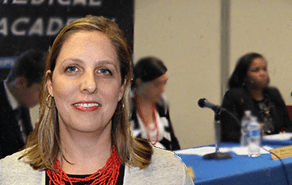Why Dr. Narvaez Came , Why She Left – and What Happened in Between
Hartford School Superintendent Beth Schiavino-Narvaez December 8th completed her last day on the job after a whirlwind hiring process, deliberate transition planning, listening tours leading to a five-year strategic plan, and efforts in line with her self-identification as an “equity warrior”. She leaves for her family but recognizes the cost to the District in terms of leadership stability.
“I feel guilty about that,” the superintendent told us in a recent interview in her office. “There’s been so much uncertainty throughout my entire time here … so much churn.”
Even before she was hired, in her first April 2014 meetings with stakeholders, Dr. Narvaez made clear her interest in confronting equity issues – and adapting her past approach of deploying assistant superintendents to promote and sharpen instructional leadership at the school level.
Gracefully, Dr. Narvaez last month took a clear look back on her Hartford experience during our interview, highlighting these points of emphasis during her leadership:
- Making a big bet on development of a strategic plan at the system-wide level and student success plans at the individual level, knowing the District would have to be explicit about adult expectations, too;
- Reversing the trends on chronic absenteeism and out-of-school suspensions, in part through restorative justice techniques (closely related factors), about which Dr. Narvaez declared early on, “We will not criminalize our children”;
- Advancing an acceleration agenda for the lowest-performing schools (“There was not a turnaround strategy here except to give schools to other people to manage”);
- Seeking to diagnose needs and build on strengths, crafting a community of practice with principals (comprising assistant superintendents of school improvement, including her acting successor, Dr. Leslie Torres-Rodriguez);
- Taking the job at a time when City funding had been flat for seven years and therefore seeking to change the climate (which elevated people to protect their agendas as “You see that happening in a time of scarcity”);
- Questioning the lack of planning that led to an unsustainable number of under-enrolled schools (“We started adding without taking away”);
- Pursuing the vision that “neighborhood schools can be a true – high quality – option for all families”; and
- Looking at consolidation and relocation: The Equity 2020 planning effort began when renovated Clark and Martin Luther King, Jr. Schools still were on the table. But those options evaporated fast.
A Positive View of Hartford
Rebutting the notion that she focused more on virtues than difficulties, Dr. Narvaez told us, to the contrary, that she did not do a good enough job of extolling the virtues of this hard-pressed school system. “This is not an incompetent system – and not a system without capacity,” she insisted.
Asserting that Hartford is gradually changing the narrative of what is possible in urban education, she offered a vision for the future she will not realize: that Hartford hosts high-quality neighborhood and magnet schools and full-service community schools throughout the city.
Commenting on what’s next, Dr. Narvaez advised that “the next superintendent needs political cover to take on school consolidation; these are the toughest issues and they have not been addressed for decades.”
Citing “a little case study” for the good of the order: when Clark School had to close for environmental concerns, its student mergers gave Wish School a robust enrollment – and some 60 Clark families have elected to go to West Middle School. Those developments showed that some school closings and consolidations can indeed work, Dr. Narvaez observed.
As to the Early Departure
“I was getting recruited to other districts and I said no,” Dr. Narvaez noted. “For me, Hartford has been a really incredible experience.”
Yet, as she has stated, her husband and daughter come from the Pacific, which is why she accepted a job offer in the Department of Defense system, where she will be based in Okinawa. Family first.
To put it mildly, Dr. Narvaez’s decision to resign, just two years into her tenure, notwithstanding a contract extension to 2018, was a big surprise. Yet, plainly, from her first public meetings when she was applying for the job, through the deliberate work on transition and strategic planning, Dr. Narvaez has been all about sounding this District’s call for educational equity.
The Bottom Line
Continuing the focus on equity – and taking it to the next level – is now the job of those still here and those still to come. As we mentioned in our Annual Letter earlier this fall, bold ideas on how to shift the concentration of need and resources in our neighborhood schools are what’s needed, or it won’t matter who the next superintendent is. Without that focus on neighborhood schools, change will still come too slowly for our students and our region’s economy.

